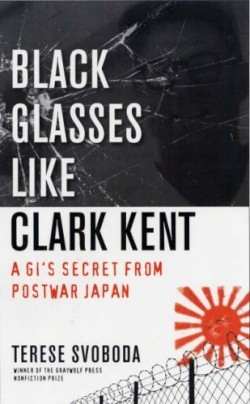Black Glasses Like Clark Kent
A GI's Secret from Postwar Japan
When her Uncle Don said she ought to write a book about him, Terese Svoboda was skeptical. A published poet and novelist, Svoboda knew how tricky the publishing world could be, and her uncle’s story didn’t look promising at first glance. But in 2004, when the Abu Ghraib prison scandal began to taint the US occupation of Iraq, Svoboda’s trim, eighty-year-old uncle with no history of mental illness checked himself into a psychiatric hospital. Taking a closer look at the memoirs her uncle had been sending to her, Svoboda uncovered suggestions of malfeasance, even murder at the Eighth Army Stockade where Uncle Don had worked as an MP after World War II. But before his niece could get the rest of the story, Uncle Don, “the perfect match for Kryptonite,” had committed suicide.
Black Glasses Like Clark Kent is not another paean to the Greatest Generation. It is an investigative essay enriched with family story and a meditation on memory and the residue of war. It is the record of Svoboda’s attempt to find out what happened after World War II at the stockade at Nakano, about twenty miles from Tokyo. Svoboda documents her visits to Japan, her trips to US Army records centers and National Archives, and her interviews with her uncle’s fellow servicemen. The research is fraught with difficulties. (“Smoke, that’s what I’m in pursuit of…”). Records have been altered or destroyed, and most of the few surviving US soldiers do not want to talk about the past. But Svoboda finds evidence to support her belief that her uncle’s suicide was connected to his time at Nakano, and that unreported executions (of mostly black soldiers) took place there. Excerpts from Uncle Don’s memoirs and letters, and comments by American and Japanese survivors give readers a sense of the lawlessness and debauchery—“smoky sex from the Japanese panpan girls with their long red fingernails”—that characterized the US occupation of a ruined Japan, an occupation which lasted until the San Francisco Treaty of 1952.
Born in Nebraska and now a resident of New York City, Svoboda’s work has appeared in Harper’s, The New Yorker, and Vogue. Black Glasses Like Clark Kent won the 2007 Graywolf Nonfiction Prize.
Reviewed by
Joe Taylor
Disclosure: This article is not an endorsement, but a review. The publisher of this book provided free copies of the book to have their book reviewed by a professional reviewer. No fee was paid by the publisher for this review. Foreword Reviews only recommends books that we love. Foreword Magazine, Inc. is disclosing this in accordance with the Federal Trade Commission’s 16 CFR, Part 255.

